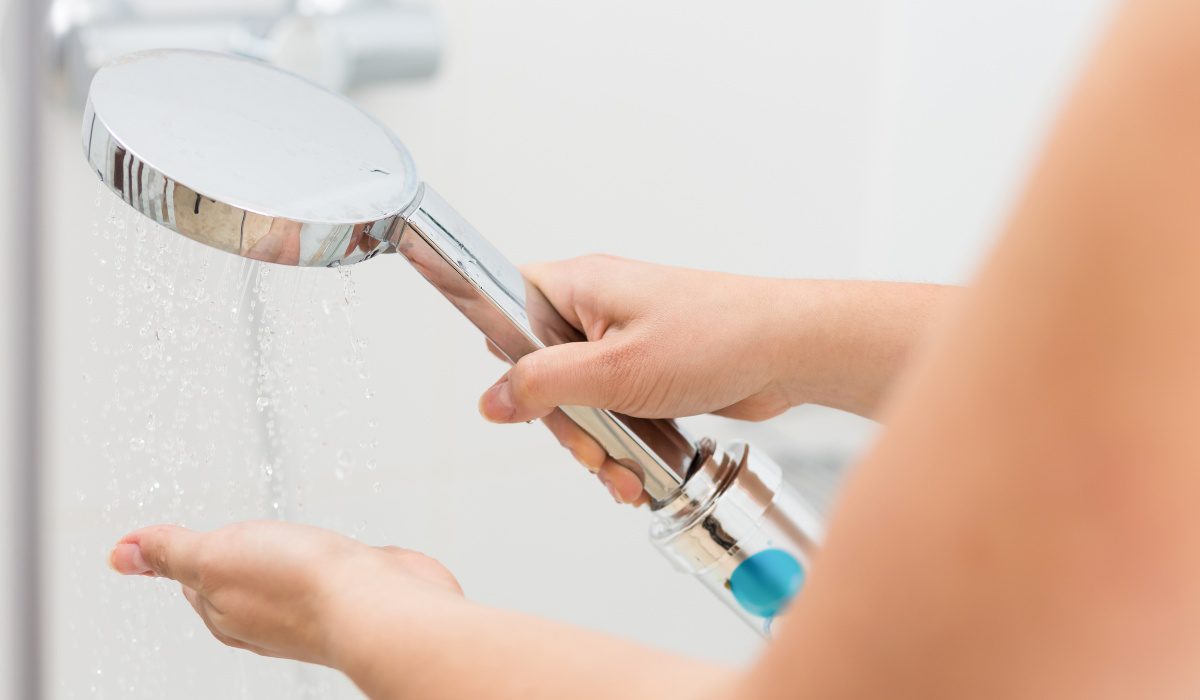The water supply in a lot of regions, especially urban areas, might not be fit for consumption. While RO water filters generally take care of potable water, we don’t often pay much attention to the quality of water we are consuming for other purposes, such as showering and washing. Hard water and water with chemicals and impurities can cause harm even if not consumed for potable purposes. Filtered showerheads can be a viable solution to this problem. In this article, we will delve into the pros and cons of installing a filtered showerhead to help you decide whether it is the solution to your water quality woes.
See also: Choosing the right showerhead for your bathroom
Pros of filtered showerheads
Removes harmful chemicals
The water supplied by municipalities is generally treated with chlorine, chloramine and other disinfectants to kill bacteria. While this step ensures that the water you use is safe for consumption, the chemicals can strip natural oils from your skin and hair, leading to dryness and irritation. Filtered showerheads use carbon, kinetic degradation fluxion (KDF) and similar filtration materials to trap and neutralise these chemicals to improve overall water quality.
Improves skin and hair health
The mineral content in hard water and chlorine can irritate sensitive skin and worsen conditions like eczema, psoriasis and acne. These elements also tend to make hair dull, brittle or frizzy. A filtered showerhead filters out these irritants to provide gentler water that helps maintain your skin’s natural moisture and hair’s softness.
Softens hard water
High levels of minerals like calcium and magnesium in hard water can leave residue on your skin, hair and shower surfaces. Specific filtered showerheads come with softening capabilities to reduce these minerals, making the water healthier and helping soaps and shampoos lather better and provide superior cleansing results.
Improves water odour and taste
If the water being supplied has high levels of sulphur or iron, it can smell like rotten eggs or have a metallic taste. While not posing any health risks per se, these odours can make your showering experience unpleasant. Installing a filtered showerhead can help avoid this by neutralising the odours by removing the sulphur compounds and iron particles.
Reduces limescale buildup
The mineral content in hard water can cause limescale deposits, which can clog showerheads and significantly reduce their efficiency over time. By filtering out these minerals, filtered showerheads prevent buildup and ensure consistent water flow, also extending the life of your showerhead.
Environmentally friendly
When the quality of water you are using is poor, it might drive you to use more hair conditioner, moisturisers and soaps to counteract its effects. By installing a filtered showerhead, you can be assured of a long-term solution and reduce your reliance on these products. This can further lead to a decrease in waste generated from plastic containers and the environmental impact of chemical-laden runoff.
Easy installation
Most filtered showerheads are designed for DIY installation, requiring no specialised tools or plumbing expertise. You simply need to unscrew your existing showerhead and attach the filtered one to enjoy cleaner water. The upgrade process is a breeze.
Cons of filtered showerheads
Cost
Filtered showerheads tend to be more expensive than standard ones, with prices ranging from 1100 – 2500 INR, subject to model and features. Additionally, the filters require replacement every 6 – 12 months, depending on your water quality and usage, that can cost an extra 600 – 1000 INR.
Reduced water pressure
If you live in regions with already low water pressure, the filtration process can restrict the flow further. While there are showerheads available especially designed to minimise this issue, most models might result in a noticeably weaker shower stream. This can be a drawback for people who prefer high-pressure showers.
Maintenance requirements
To ensure effective functioning of the showerhead over time, the filters need to be replaced regularly. Failing to do so can lead to clogs or reduced filtration efficiency, thereby diminishing the benefits and potentially causing more issues with water flow.
Limited filtration capacity
While filtered showerheads can remove most contaminants, they are not capable of addressing all of them. For instance, heavy metals, bacteria or viruses may pass unnoticed through these filters. So if you are dealing with severe water contamination, it is recommended to incorporate additional water treatment systems for best results.
Compatibility issues
Not all filtered showerheads are designed to fit every type of shower arm or plumbing system. Some might require adapters or additional fittings, making for a more complex installation process. In some cases, compatibility issues might also arise with certain water heaters or pressure systems.
Reduced efficiency over time
As debris and contaminants accumulate in the filters, they can become clogged and result in reduced water flow and filtration effectiveness. This tends to happen sooner in areas with highly contaminated or hard water, calling for more frequent maintenance or replacement of the filter.
Limited customisation options
Unlike regular showerheads, filtered showerheads are solely designed to prioritise functionality. As a result, they may not offer the variety of spray settings, aesthetic styles or luxury features that some standard showerheads do. This can limit the personalisation of your shower experience.
FAQs
How does a filtered showerhead improve skin and hair health?
Filtered showerheads remove chemicals used during the treatment process and hard water minerals that strip natural oils from skin and hair, resulting in softer, hydrated and shinier skin and hair.
Will using a filtered showerhead reduce water pressure?
Some filtered showerheads may slightly reduce water pressure due to the filtration process, especially if the filter becomes clogged over time.
What happens if I don’t replace the filter in a showerhead?
Showerhead filters need replacement every 6 - 12 months to avoid clogging, reduced water flow and diminished filtration effectiveness.
Can a filtered showerhead remove all contaminants from water?
Filtered showerheads are primarily designed to remove chlorine, chloramine and minerals and are not effective on heavy metals, bacteria or viruses.
Are filtered showerheads compatible with all plumbing systems?
While most showerheads are designed for standard shower arms, some may require additional adapters or fittings for certain systems.
Is it expensive to maintain a filtered showerhead?
Upfront costs for filtered showerheads are higher than regular ones, ranging from 1100 - 2500 INR. Additionally, the replacement cost for filters might be anything between 600 - 1000 INR.
Are there any aesthetic or functional drawbacks to using a filtered showerhead?
Filtered showerheads offer fewer design options and spray settings as compared to standard ones, thereby compromising on aesthetics.
| Got any questions or point of view on our article? We would love to hear from you. Write to our Editor-in-Chief Jhumur Ghosh at jhumur.ghosh1@housing.com |







